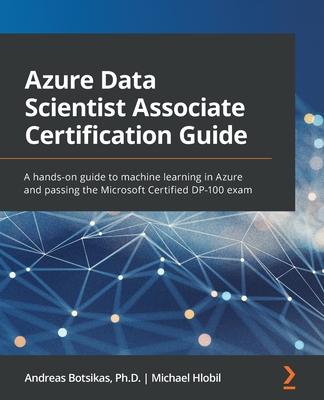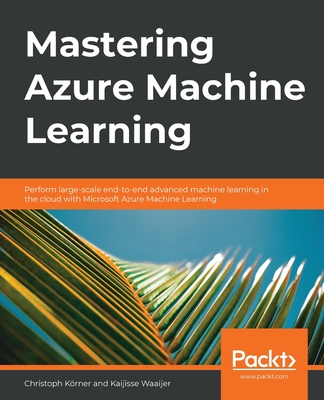Azure Data Scientist Associate Certification Guide: A hands-on guide to machine learning in Azure and passing the Microsoft Certified DP-100 exam
暫譯: Azure 數據科學家助理認證指南:在 Azure 中進行機器學習的實作指南及通過微軟認證 DP-100 考試的秘訣
Andreas Botsikas , Michael Hlobil
- 出版商: Packt Publishing
- 出版日期: 2021-12-03
- 售價: $2,000
- 貴賓價: 9.5 折 $1,900
- 語言: 英文
- 頁數: 448
- 裝訂: Quality Paper - also called trade paper
- ISBN: 1800565003
- ISBN-13: 9781800565005
-
相關分類:
Python、Machine Learning、Microsoft Azure
海外代購書籍(需單獨結帳)
相關主題
商品描述
Key Features
- Create end-to-end machine learning training pipelines, with or without code
- Track experiment progress using the cloud-based MLflow-compatible process of Azure ML services
- Operationalize your machine learning models by creating batch and real-time endpoints
Book Description
The Azure Data Scientist Associate Certification Guide helps you acquire practical knowledge for machine learning experimentation on Azure. It covers everything you need to pass the DP-100 exam and become a certified Azure Data Scientist Associate.
Starting with an introduction to data science, you'll learn the terminology that will be used throughout the book and then move on to the Azure Machine Learning (Azure ML) workspace. You'll discover the studio interface and manage various components, such as data stores and compute clusters.
Next, the book focuses on no-code and low-code experimentation, and shows you how to use the Automated ML wizard to locate and deploy optimal models for your dataset. You'll also learn how to run end-to-end data science experiments using the designer provided in Azure ML Studio.
You'll then explore the Azure ML Software Development Kit (SDK) for Python and advance to creating experiments and publishing models using code. The book also guides you in optimizing your model's hyperparameters using Hyperdrive before demonstrating how to use responsible AI tools to interpret and debug your models. Once you have a trained model, you'll learn to operationalize it for batch or real-time inferences and monitor it in production.
By the end of this Azure certification study guide, you'll have gained the knowledge and the practical skills required to pass the DP-100 exam.
What you will learn
- Create a working environment for data science workloads on Azure
- Run data experiments using Azure Machine Learning services
- Create training and inference pipelines using the designer or code
- Discover the best model for your dataset using Automated ML
- Use hyperparameter tuning to optimize trained models
- Deploy, use, and monitor models in production
- Interpret the predictions of a trained model
Who this book is for
This book is for developers who want to infuse their applications with AI capabilities and data scientists looking to scale their machine learning experiments in the Azure cloud. Basic knowledge of Python is needed to follow the code samples used in the book. Some experience in training machine learning models in Python using common frameworks like scikit-learn will help you understand the content more easily.
商品描述(中文翻譯)
**主要特點**
- 創建端到端的機器學習訓練管道,無論是否使用程式碼
- 使用基於雲端的 MLflow 相容流程追蹤實驗進度,透過 Azure ML 服務
- 透過創建批次和即時端點來運營化您的機器學習模型
**書籍描述**
《Azure 數據科學家助理認證指南》幫助您獲得在 Azure 上進行機器學習實驗的實用知識。它涵蓋了您需要通過 DP-100 考試並成為認證 Azure 數據科學家助理的所有內容。
本書從數據科學的介紹開始,您將學習整本書中將使用的術語,然後轉向 Azure 機器學習 (Azure ML) 工作區。您將發現工作室介面並管理各種組件,例如數據存儲和計算叢集。
接下來,本書專注於無程式碼和低程式碼的實驗,並展示如何使用自動化機器學習 (Automated ML) 向導來尋找和部署適合您數據集的最佳模型。您還將學習如何使用 Azure ML Studio 中提供的設計器運行端到端的數據科學實驗。
然後,您將探索 Azure ML 的 Python 軟體開發工具包 (SDK),並進一步學習如何使用程式碼創建實驗和發佈模型。本書還指導您使用 Hyperdrive 優化模型的超參數,然後演示如何使用負責任的 AI 工具來解釋和調試您的模型。一旦您擁有一個訓練好的模型,您將學習如何將其運營化以進行批次或即時推斷,並在生產環境中監控它。
在這本 Azure 認證學習指南結束時,您將獲得通過 DP-100 考試所需的知識和實用技能。
**您將學到的內容**
- 在 Azure 上為數據科學工作負載創建工作環境
- 使用 Azure 機器學習服務運行數據實驗
- 使用設計器或程式碼創建訓練和推斷管道
- 使用自動化機器學習尋找適合您數據集的最佳模型
- 使用超參數調整來優化訓練好的模型
- 在生產環境中部署、使用和監控模型
- 解釋訓練模型的預測結果
**本書適合誰**
本書適合希望將 AI 能力融入其應用程式的開發人員,以及希望在 Azure 雲端擴展其機器學習實驗的數據科學家。需要具備基本的 Python 知識以跟隨書中使用的程式碼範例。對於使用常見框架如 scikit-learn 在 Python 中訓練機器學習模型的經驗將有助於您更輕鬆地理解內容。
作者簡介
Andreas Botsikas is an experienced advisor working in the software industry. He has worked in the finance sector, leading highly efficient DevOps teams, and architecting and building high-volume transactional systems. He then traveled the world, building AI-infused solutions with a group of engineers and data scientists. Currently, he works as a trusted advisor for customers onboarding into Azure, de-risking and accelerating their cloud journey. He is a strong engineering professional with a Doctor of Philosophy (Ph.D.) in resource optimization with artificial intelligence from the National Technical University of Athens. Michael Hlobil is an experienced architect focused on quickly understanding customers' business needs, with over 25 years of experience in IT pitfalls and successful projects, and is dedicated to creating solutions based on the Microsoft Platform. He has an MBA in Computer Science and Economics (from the Technical University and the University of Vienna) and an MSc (from the ESBA) in Systemic Coaching. He was working on advanced analytics projects in the last decade, including massive parallel systems and Machine Learning systems. He enjoys working with customers and supporting the journey to the cloud.
作者簡介(中文翻譯)
安德烈亞斯·博茲卡斯(Andreas Botsikas)是一位在軟體產業中擁有豐富經驗的顧問。他曾在金融領域工作,領導高效的 DevOps 團隊,並設計和建造高交易量的系統。之後,他環遊世界,與一群工程師和數據科學家一起構建融合人工智慧的解決方案。目前,他擔任客戶在 Azure 上線的信任顧問,幫助降低風險並加速他們的雲端旅程。他是一位強大的工程專業人士,擁有雅典國立技術大學的人工智慧資源優化博士學位(Ph.D.)。邁克爾·赫洛比爾(Michael Hlobil)是一位經驗豐富的架構師,專注於快速理解客戶的商業需求,擁有超過 25 年的 IT 失誤和成功專案經驗,致力於基於 Microsoft 平台創建解決方案。他擁有計算機科學和經濟學的 MBA(來自技術大學和維也納大學)以及系統教練的碩士學位(來自 ESBA)。在過去十年中,他參與了先進分析專案,包括大規模並行系統和機器學習系統。他喜歡與客戶合作,支持他們的雲端旅程。
目錄大綱
Table of Contents
- An Overview of Modern Data Science
- Deploying Azure Machine Learning Workspace Resources
- Azure Machine Learning Studio Components
- Configuring the Workspace
- Letting the Machines Do the Model Training
- Visual Model Training and Publishing
- The AzureML Python SDK
- Experimenting with Python Code
- Optimizing the ML Model
- Understanding Model Results
- Working with Pipelines
- Operationalizing Models with Code
目錄大綱(中文翻譯)
Table of Contents
- An Overview of Modern Data Science
- Deploying Azure Machine Learning Workspace Resources
- Azure Machine Learning Studio Components
- Configuring the Workspace
- Letting the Machines Do the Model Training
- Visual Model Training and Publishing
- The AzureML Python SDK
- Experimenting with Python Code
- Optimizing the ML Model
- Understanding Model Results
- Working with Pipelines
- Operationalizing Models with Code











